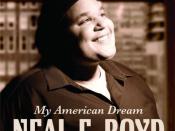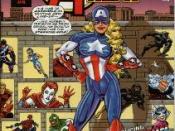Introduction
Death of a Salesman reveals the story of an American man confronting failure in a success-driven society and shows the tragic path which eventually leads to his suicide. Willy Loman believes in what he considers the promise of the American Dream wholeheartedly, which is based on the Declaration of Independence stated by Thomas Jefferson in 1776: "We believe that all men are born with these inalienable rights - life, liberty and the pursuit of happiness."(Malone, 28)
However, Willy is too caught up in this masculine dream and it does not succeed as he wishes. He tries to live up to it and prove himself by working as a successful salesman, but he does not even come close to it. The play examines the cost of blind faith in the American Dream and how a man cannot escape his own pattern of the past. His sons, Biff and Happy, cannot get away from the pattern Willy imposes on them either.
What is the relationship between this disillusionment of the American Dream and the construction of masculinity? Can the construction of manhood be shattered just like the dream? This essay serves to answer these questions by examining the making of masculinity as seen in the three major characters.
The Modern Tragic Hero
Willy is a character who sets his ideals on the essences of "self-made manhood" and "passionate manhood" described by Rotundo. Although he has been the supporter of the family and is the "head of the household" (Rotundo, 2), he cannot fully exemplify the "communal manhood" phase as suggested by Rotundo. He pays for the house, the refrigerator, the vacuum cleaner, and puts up ceiling in the living room, without his wife's financial or physical involvement. But he never really has a respectable place in the community. His boss,



Summary is weak
The summary, as I know it should be a summarization of the essay. I should not ask the reader questions. There is a lot of information in the essay and there should be no questions.
1 out of 1 people found this comment useful.